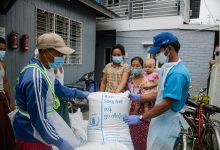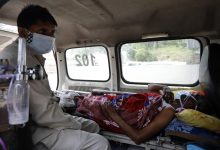‘Prompt, independent, impartial investigations’ needed in Kazakhstan: UN rights office
 As the death toll from the recent unrest in Kazakhstan mounts to 164, the UN Office for Human Rights (OHCHR) on Tuesday requested “prompt, independent, impartial investigations” into the killings, and whether “unnecessary and disproportionate use of force was made by security forces”.
As the death toll from the recent unrest in Kazakhstan mounts to 164, the UN Office for Human Rights (OHCHR) on Tuesday requested “prompt, independent, impartial investigations” into the killings, and whether “unnecessary and disproportionate use of force was made by security forces”.
Close to 10,000 people are now estimated to be held in detention following the riots. “We understand that the Ministry of Interior has announced that some 9,900 people are in detention as of the 11th of January. Now, this is clearly a huge number,” said OHCHR spokesperson Liz Throssell, briefing reporters at the United Nations in Geneva (UNOG).
“Under international law, people have the right to protest peacefully and the right to express their opinions. And they shouldn’t be detained simply for expressing their opinions”, Ms. Throssell added.
“All those arrested and detained solely for exercising these rights should be released immediately”, she added.
She said damage and destruction around the country’s largest city of Almaty had been widely witnessed and reported, and although the UN has no clear breakdown of who is being detained, “clearly there will be some people who have been arrested and are likely to be charged,” the OHCHR spokesperson said.
She added, that “at the same time, of course, we have to also stress clearly that there were also armed individuals who were taking to the streets of Almaty and other parts of Kazakhstan”.
Due process
Ms. Throssell stressed that all detainees should have access to a lawyer, as part of their basic human rights.
“What is very important for us is that the ombudsperson, the Kazakh ombudsperson, is able to fulfil fully her mandate related to what is called the national preventive mechanism, and that relates to torture, by visiting places of detention”, she said.
According to news agencies, protests began on Sunday when the government lifted its price cap on liquified petroleum gas (LPG), a popular fuel for cars and heating – although that hike was later reversed. Unrest appeared to spread rapidly to include longstanding political grievances.
A state of emergency, which was declared in several areas of Kazakhstan on 5 January (including in the main city of Almaty and the capital, Nur-Sultan) has been extended to the whole country.
A week after the start of the riots that shook the country, calm is gradually returning to Almaty, the largest city in Kazakhstan. A day of mourning is being observed throughout the country on Tuesday, while the telephone network, Internet and public transport are gradually being restored, OHCHR said.
‘Lethal force’ order
Meanwhile, UN independent human rights experts on Tuesday, called on the Kazakhstan authorities and security forces to “halt their unrestrained use of force, including lethal force” directed at protesters and called for independent and human-rights based investigations into how the Government used force in recent days to quell protests.
In a statement, the Human Rights Council-appointed experts said they were profoundly concerned that Kazakhstan’s President reportedly gave orders to security forces and army to “open fire with lethal force” against protesters he described as “bandits and terrorists”.
The Special Rapporteur on counter-terrorism and human rights, Fionnuala Ní Aoláin, who carried out an official visit to Kazakhstan in May 2019 – including to Aktau and Almaty – both areas where protests too place – said that Kazakhstan’s overly broad use of the word “terrorism” in this context against protesters, civil society activists, human rights defenders, journalists and political parties, appeared to be aimed at instilling fear and was deeply concerning.
Her comments were endorsed by several other independent UN experts.
‘Terrorism’ charge wrongly applied
They cautioned against the inaccurate, rhetorical and overly broad use of the term, noting such use was inconsistent with international law and undermined human rights for all in Kazakhstan.
Misuse of the word “terrorism” undermines the security of all, and “cheapens” this term which has a specific meaning in international law, the statement continued.
The experts highlighted that the term should not be used “to silence those who do not share the Government’s opinion, who are protesting about social and economic conditions, and expressing political views.”
Acts of violence should be appropriately dealt with under Kazakhstan’s comprehensive criminal code, they added, which is “adequately equipped to address these acts. The Government must protect the legitimate exercise of fundamental freedoms, including freedom of expression, and peaceful assembly and association”, they said.
“The expansive branding of protesters as terrorists is a way to use Kazakhstan’s overly broad terrorism legislation that allows for the use of force, including a ‘shoot to kill’ policy, against any individual determined to be a ‘terrorist’,” the experts said.
“Such wholesale barriers to freedom of expression and assembly premised on terrorism are absolutely contrary to the strict provisions under international human rights law on the right to life.”
The experts recalled that the use of lethal force must be used solely in self-defence and when all other means have been exhausted, including non-lethal force. They stressed that these principles were also applicable to foreign forces operating on the territory of Kazakhstan with its consent.



